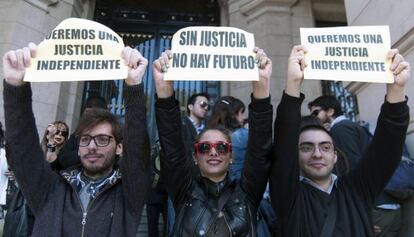Clarín Group wins another round in battle over Argentina’s media law
Government announces it will appeal ruling before the Supreme Court


The government of President Cristina Fernández de Kirchner suffered another legal setback in its efforts to break up the country’s largest media monopoly when an appeals court ruled Wednesday in favor of Clarín, the conglomerate that has been battling the administration since 2009 over a new broadcasting law.
Three judges of the chamber that hears civil and trade cases ruled that Grupo Clarín does not have to give up its broadcast licenses for cable television and paid channels as Fernández de Kirchner’s measure required.
The group — owned by Ernestina Herrera de Noble and Héctor Magnetto — would have had to relinquish between 150 and 200 licenses for television and radio stations across the country if a section of the law Clarín was challenging had been applied.
Instead, the judges ruled that Clarín should only comply with part of the broadcasting law that limits to 10 the number of free-to-air licenses for both radio and television held by any one media company. Clarín has 11, and stated that it would sell one of the licenses, but the Federal Audiovisual Communications Services Authority (AFSCA) had said that the group actually has 25 and must therefore relinquish 15.
This is a deceitful decision that gives Clarín everything it wanted"
The court declared constitutional another section of the law challenged by Clarín that orders media companies who own more than the 10-license limit to divest them within one year of the legislation hitting the statute books. The bill was passed late last year.
As soon as the decision was handed down on Wednesday, the government announced that it would appeal the ruling before the Supreme Court.
“This is a deceitful decision that attempts to make the situation more confusing,” said Martín Sabbatella, the head of AFSCA. “This ruling allows that free-to-air channels and cable TV services can be superimposed [in the same city]; eliminates the 24-license limit for cable television; does away with the maximum 35-percent market holding; and eliminates the limit of broadcast signals on cable television — in other words everything that Clarín wanted,” he said.
Grupo Clarín and Fernández de Kirchner have been waging a public battle since 2009 when the government began restructuring broadcasting laws and the traditional printing operations run by newspapers. Clarín, which is one of the largest Buenos Aires dailies, has been critical of the administration’s policies, leading some in Fernández de Kirchner’s Peronist faction to level accusations of biased reporting.
Grupo Clarín had good relations with the president’s late husband and predecessor, Néstor Kirchner, who served from 2003 to 2007, as well as with the military dictators that ran the country from 1976 to 1983.
The ongoing legal battle has also put Fernández de Kirchner at odds with the judiciary. She has accused the judges on the Supreme Court of favoritism and this month introduced a package of reforms she says will help “democratize” the justice system. The proposed legal restructuring is now before Congress which is debating the matter.
Thousands of protestors have come out against the president’s planned changes, claiming that she wants to control what is now an independent judiciary.
Tu suscripción se está usando en otro dispositivo
¿Quieres añadir otro usuario a tu suscripción?
Si continúas leyendo en este dispositivo, no se podrá leer en el otro.
FlechaTu suscripción se está usando en otro dispositivo y solo puedes acceder a EL PAÍS desde un dispositivo a la vez.
Si quieres compartir tu cuenta, cambia tu suscripción a la modalidad Premium, así podrás añadir otro usuario. Cada uno accederá con su propia cuenta de email, lo que os permitirá personalizar vuestra experiencia en EL PAÍS.
¿Tienes una suscripción de empresa? Accede aquí para contratar más cuentas.
En el caso de no saber quién está usando tu cuenta, te recomendamos cambiar tu contraseña aquí.
Si decides continuar compartiendo tu cuenta, este mensaje se mostrará en tu dispositivo y en el de la otra persona que está usando tu cuenta de forma indefinida, afectando a tu experiencia de lectura. Puedes consultar aquí los términos y condiciones de la suscripción digital.








































